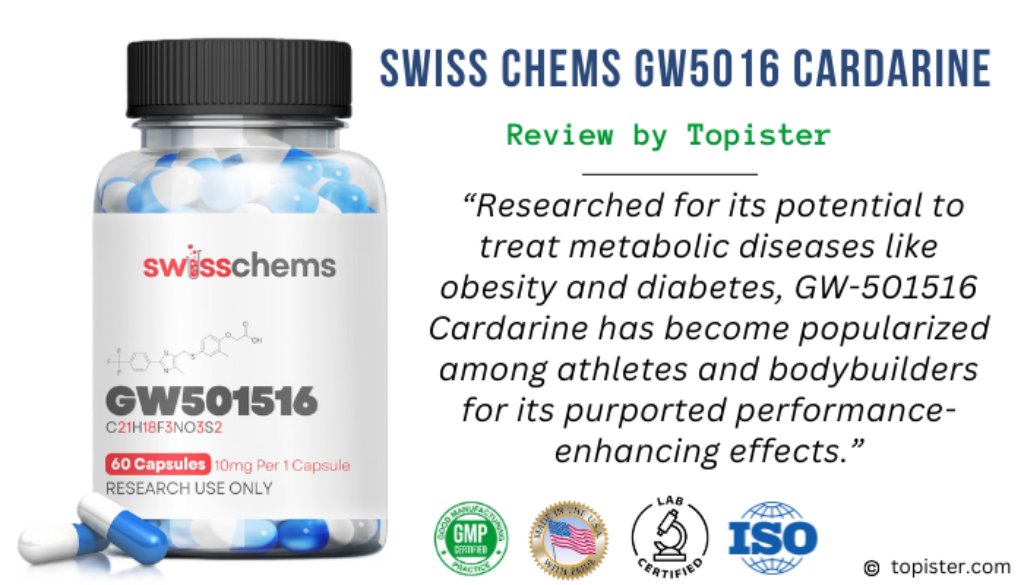Swiss Chems GW 501516 Cardarine Reviews: Hype or Hidden Dangers?
Swiss Chems GW-501516 Cardarine Reviews by Topister welcomes you to this blog post.
The world of fitness supplements is brimming with products promising exceptional results. GW-501516, often called Cardarine, has emerged as a controversial name, capturing the attention of athletes and bodybuilders seeking an edge.
But before diving into the world of Cardarine, it’s crucial to dissect the facts from fiction. This review will offer a comprehensive exploration of Cardarine, examining its purported benefits, potential risks, and the legality surrounding its use.
We’ll delve into the science behind Swiss Chems GW-501516 Cardarine, investigating its mechanism of action and the research available to support its claimed effects.
We’ll also shed light on the potential side effects, some of which can be severe, associated with Cardarine use. Additionally, we’ll explore the legal landscape surrounding Cardarine, investigating its status within regulatory bodies and the potential consequences of using it.
By the end of this Swiss Chems GW-501516 Cardarine reviews, you’ll be equipped with the knowledge to make an informed decision about Cardarine. So, whether you’re a seasoned athlete or just starting your fitness journey, buckle up as we dissect the truth behind GW-501516 Cardarine.
What is Swiss Chems GW-501516 Cardarine?
Swiss Chems GW-501516, also known by its more common name Cardarine, is a synthetic compound that falls into the category of selective androgen receptor modulators (SARMs).
Despite being often grouped with SARMs, Cardarine operates differently as it doesn’t target androgen receptors directly. Instead, it functions as a peroxisome proliferator-activated receptor delta (PPARδ) agonist.
Originally developed in the 1990s by Ligand Pharmaceuticals and GlaxoSmithKline, Cardarine was initially investigated for its potential in treating metabolic diseases such as obesity, diabetes, and dyslipidemia due to its ability to enhance fat burning and increase energy expenditure.
It gained notoriety for its purported capacity to significantly improve endurance and stamina, making it popular among athletes and bodybuilders.
Swiss Chems GW-501516 Cardarine as a synthetic compound that exists in a grey area between supplement and medication.
Initially researched for its potential to treat metabolic diseases like obesity and diabetes, Cardarine has become popularized among athletes and bodybuilders for its purported performance-enhancing effects.
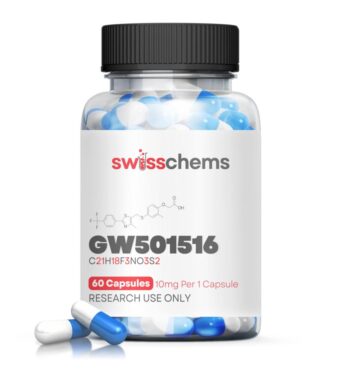
However, it’s important to understand that Cardarine is not a regulated supplement and carries significant risks due to its status as a research chemical.
Moreover, it’s important to note that Cardarine’s safety and long-term effects in humans are still under scrutiny, as research on its potential health risks, including its potential to promote cancer cell growth in animal studies, has raised concerns. As a result, it is not approved for human use and is classified as a prohibited substance in many sports organizations.
Swiss Chems GW-501516 Cardarine: How It Works?
Swiss Chems GW-501516 Cardarine, exerts its effects primarily through its interaction with the peroxisome proliferator-activated receptor delta (PPARδ). PPARδ is a type of nuclear receptor found in various tissues throughout the body, including muscle, liver, and adipose tissue.
When Cardarine binds to PPARδ, it initiates a cascade of molecular events that ultimately influence cellular processes related to energy metabolism.
One of the key mechanisms by which Cardarine operates is its ability to enhance the oxidation of fatty acids. By activating PPARδ, Cardarine stimulates the expression of genes involved in fatty acid metabolism and mitochondrial biogenesis.
This leads to an increase in the uptake and utilization of fatty acids by muscle cells, promoting fat burning and energy production.
Additionally, Cardarine has been shown to increase the expression of genes involved in glucose uptake and utilization in skeletal muscle cells. This can improve glucose metabolism and insulin sensitivity, potentially offering benefits for individuals with insulin resistance or type 2 diabetes.
Furthermore, Swiss Chems GW-501516 Cardarine has been reported to enhance endurance and stamina by increasing the expression of genes involved in oxidative muscle fibers.
This can lead to improved aerobic capacity and exercise performance, making it particularly appealing to athletes and fitness enthusiasts.
Overall, Swiss Chems GW-501516 Cardarine works by activating PPARδ and modulating various metabolic pathways related to fat and glucose metabolism, as well as muscle fiber composition, ultimately leading to improvements in energy metabolism, endurance, and potentially insulin sensitivity.
However, further research is needed to fully understand its mechanisms of action and long-term effects in humans.
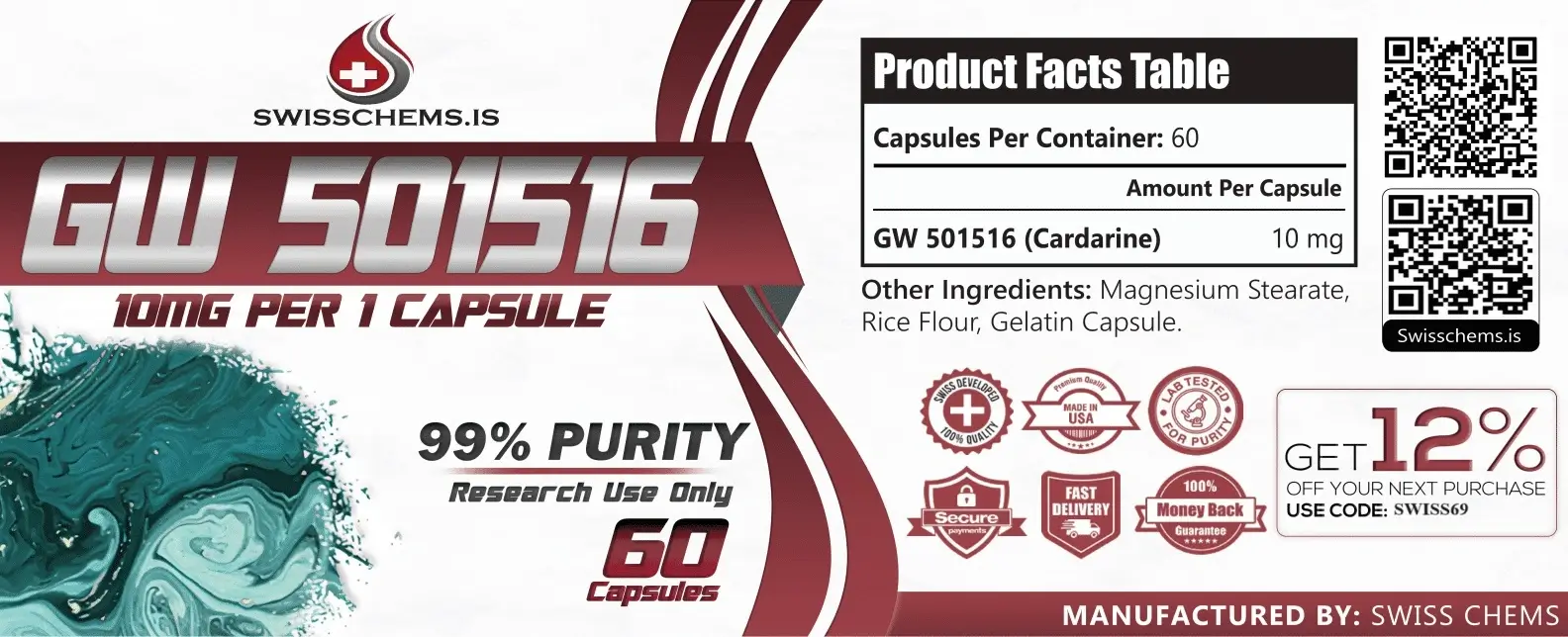
Swiss Chems GW-501516 Cardarine: Potential Side Effects and Risks to Consider
Since Swiss Chems GW-501516 Cardarine remains a research chemical, comprehensive research on its safety profile is limited. However, potential side effects associated with its use include:
- Liver Damage: Studies suggest that Cardarine might negatively impact liver function, especially with prolonged use.
- Increased Cancer Risk: While research is ongoing, some animal studies have shown a link between Cardarine use and an increased risk of developing cancer.
- Hormonal Imbalances: Cardarine’s interaction with PPARδ receptors might lead to hormonal imbalances, potentially impacting testosterone levels and other hormones.
Swiss Chems GW-501516 Cardarine: Health Benefits
Athletes and bodybuilders often turn to Cardarine for its purported advantages, although concrete scientific evidence backing these assertions is lacking. Here’s a detailed breakdown of several commonly mentioned benefits:
- Improved Endurance and Performance: Some individuals claim experiencing heightened exercise stamina with Cardarine usage. However, conclusive proof of this effect awaits robust clinical trials to validate its efficacy.
- Accelerated Recovery Times: Despite anecdotal accounts of accelerated muscle repair and recovery processes associated with Cardarine, definitive scientific data to substantiate these claims are still elusive.
- Increased Muscle Growth: Presently, there is insufficient solid evidence to assert that Cardarine directly stimulates muscle growth.
- Enhanced Fat Burning: While Cardarine may potentially impact fat metabolism, its efficacy and safety as a fat loss aid necessitate further rigorous investigation.
Given the lack of comprehensive scientific validation, caution should be exercised when considering Swiss Chems GW-501516 Cardarine purported benefits, especially in the absence of robust clinical evidence supporting its efficacy and safety profile.
Swiss Chems GW-501516 Cardarine: Usage
Disclaimer: For Research Use Only. Not For Human Consumption
Swiss Chems GW-501516 Cardarine is banned by most major sporting organizations due to its performance-enhancing potential. It’s also not approved for human consumption by any regulatory body like the FDA (Food and Drug Administration) in the United States.
Swiss Chems GW-501516 Cardarine, is often used by athletes, bodybuilders, and fitness enthusiasts for its potential benefits in improving endurance, enhancing fat loss, and promoting overall physical performance. However, it’s important to note that Cardarine is not approved for human use and its safety profile in humans is still under investigation.
When it comes to usage, Swiss Chems GW-501516 Cardarineis typically taken orally in the form of capsules or liquid solutions. Dosages can vary depending on individual factors such as weight, tolerance, and desired effects.
However, common dosages range from 10 to 20 milligrams per day, usually taken in one single dose or divided into two doses spread throughout the day. It’s essential to start with a low dose and gradually increase it to assess tolerance and minimize potential side effects.
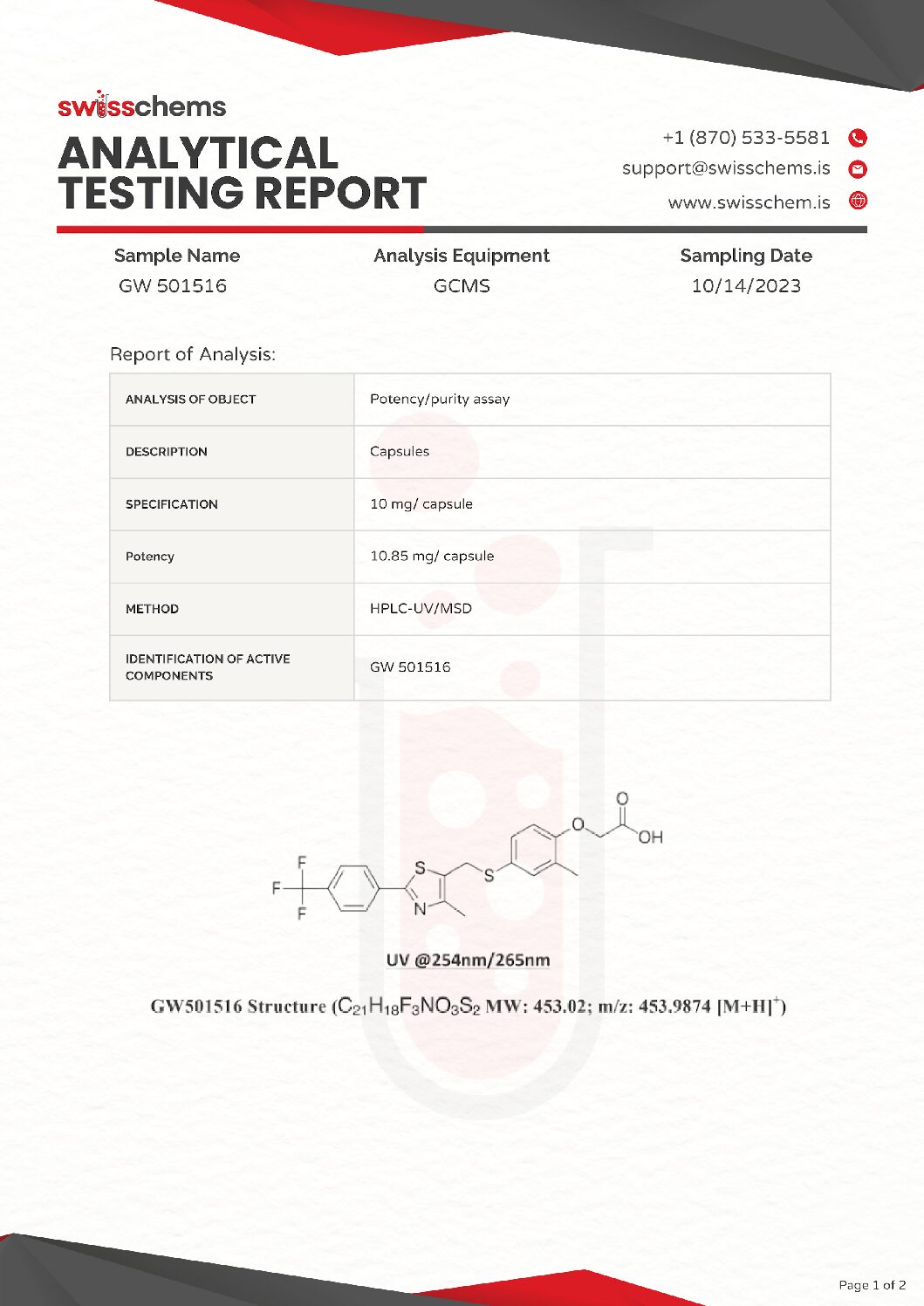
Swiss Chems GW 501516 Cardarine: Stacking Options
Swiss Chems GW 501516 Cardarine is often used in combination with other performance-enhancing substances to amplify its effects or mitigate potential side effects. Some common stacking options include:
- SARMs (Selective Androgen Receptor Modulators): Cardarine is frequently stacked with SARMs such as Ostarine (MK-2866) or Ligandrol (LGD-4033) to enhance muscle growth while reducing body fat. This combination is popular for body recomposition purposes.
- Fat Burners: Cardarine can be combined with other fat-burning compounds such as Clenbuterol or T3 (thyroid hormone) to accelerate fat loss and improve metabolic rate. However, caution should be exercised when combining Cardarine with other thermogenic agents to avoid excessive cardiovascular strain.
- Endurance Enhancers: Given its reputed endurance-boosting effects, Cardarine may be stacked with compounds like caffeine or beta-alanine to further enhance aerobic capacity and exercise performance.
- Post-Cycle Therapy (PCT): Some users incorporate Cardarine into their post-cycle therapy regimen to help maintain muscle mass and strength while recovering from a cycle of anabolic steroids or other performance-enhancing drugs. However, the use of Cardarine in PCT is controversial and not recommended due to its potential impact on hormone levels and lack of long-term safety data.
It’s crucial to emphasize that the use of Swiss Chems GW 501516 Cardarine, particularly in combination with other substances, should be approached with caution and under the guidance of a healthcare professional. Additionally, individuals should be aware of the legal implications and potential health risks associated with the use of Swiss Chems GW 501516 Cardarine and other performance-enhancing compounds.
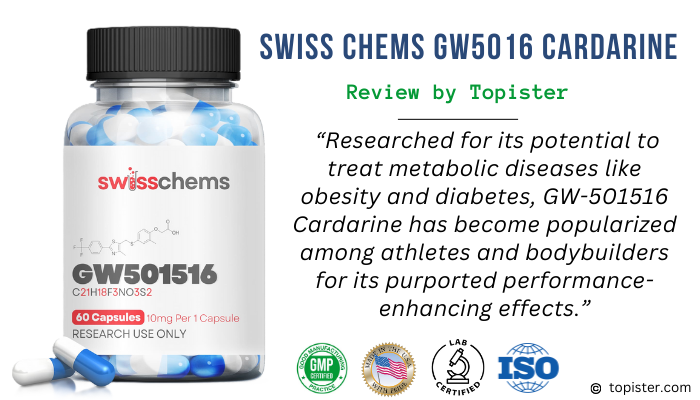
Suggested Reading: Swiss Chems MK-677 Reviews
